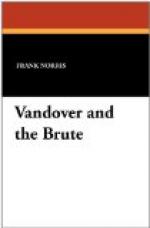After the funeral, which took place from the house, Vandover drove back alone in the hired carriage to his home. He would have paid the driver, but the other told him that the undertaker looked out for that. Vandover watched him a moment as he started his horses downhill, the brake as it scraped against the tire making a noise like the yelping of a dog. Then he turned and faced the house. It was near four o’clock in the afternoon, and everything about the house was very quiet. All the curtains were down except in one of the rooms upstairs. The butler had already opened these windows and was airing the room. Vandover could hear him moving about, sweeping up, rearranging the furniture, making up the bed again. In front of him, between the horse-block and the front door, one or two smilax leaves were still fallen, and a tuberose, already yellow. Behind him in the street he had already noticed the marks of the wheels of the hearse where it had backed up to the curb.
The crepe was still on the bell handle. Vandover did not know whether it had been forgotten, or whether it was proper to leave it there longer. At any rate he took it off and carried it into the house with him.
His father’s hat, a stiff brown derby hat, flat on the top, hung on the hatrack. This had always been a sign to Vandover that his father was at home. The sight was so familiar, so natural, that the same idea occurred to him now involuntarily, and for an instant it was as though he had dreamed of his father’s death; he even wondered what was this terrible grief that had overwhelmed him, and thought that he must go and tell his father about it. He took the hat in his hands, turning it about tenderly, catching the faint odour of the Old Gentleman’s hair oil that hung about it. It all brought back his father to him as no picture ever could; he could almost see the kind old face underneath the broad curl of the brim. His grief came over him again keener than ever and he put his arms clumsily about the old hat, weeping and whispering to himself:
“Oh, my poor, dear old dad—I’m never going to see you again, never, never! Oh, my dear, kind old governor!”
He took the hat up to his room with him, putting it carefully away. Then he sat down before the window that overlooked the little garden in the rear of the house, looking out with eyes that saw nothing.
Chapter Eleven
The following days as they began to pass were miserable. Vandover had never known until now how much he loved his father, how large a place he had filled in his life. He felt horribly alone now, and a veritable feminine weakness overcame him, a crying need to be loved as his father had loved him, and also to love some one as he himself had loved his father. Worst of all, however, was his loneliness. He could think of no one who cared in the least for him; the very thought of Turner Ravis or young Haight wrought in him an expression of scorn. He was sure that he was nothing to them, though they were the ones whom he considered his best friends.




